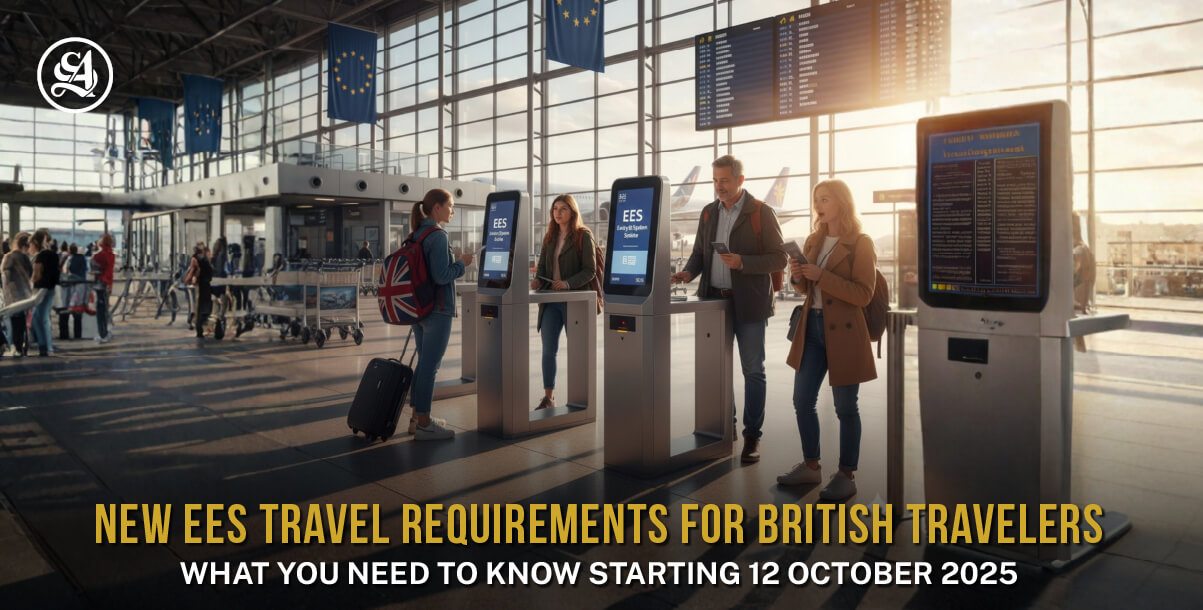Europe, being the world’s leading destination and business market, is a center of attention for all forward-thinking individuals. Having EU access in today’s era is like a dream come true, as it opens doors to various global opportunities. Europe, due to its diverse cultural sites, cuisines, languages, rich infrastructure, and landscapes, is an attractive destination for both investors and tourists worldwide. According to Statista, in 2023, Europe accounted for over half of global international tourists with more than 700 million inbound arrivals. This demonstrates that a great number of people visit Europe annually. But from October 2025, these travellers will see some major changes for entering Europe as Europe has announced plans to launch the Entry/Exit System, which will replace the previous passport stamping system at borders.
What is the EES System?
The European Union has planned to replace the manual passport stamp system with a biometric Entry/Exit System (EES), which is an automated digital border control system.. According to the European Commission’s Smart Borders Document, 700 million external border crossings are made every year. The EES systems will be launched to keep track of the non-EU nationals entering and exiting the EU Schengen area, which includes 29 countries. This means the traveler's will be registered with their facial images and fingerprints and will be scanned at airports, seaports, and land crossings. The system is expected to be implemented across all Schengen states by April 10, 2026.
How will EES Change Border Crossings for British Traveler's?
According to the European Commission, after Brexit, UK citizens are no longer considered EU nationals. The EES Systems keep track of these British visitors who are in the EU for short stays, for up to 90 days in a 180-day period. Now, after the implementation of this system, these UK nationals at their first entry to Europe have to provide a facial photo and four fingerprints to the authorities to have their passport details digitally stored in systems. However, the children under 12 will just provide the facial images.
Which British Traveler's will be Affected the Most?
The Entry/Exit system will mostly impact frequent British traveler's, including businessmen, entrepreneurs, retirees, and property owners. They have to manage their short stays, i.e, 90 days in a 180-day period, efficiently now, as the biometric system will easily track their overstays. According to Eurostat, in 2023, 1,265,350 non-EU citizens were found to be illegally living in Europe. The EES system will avoid these issues and will also speed up the process by skipping the time consumed in the manual stamping of passports.
Why Are More British Traveler's Seeking EU Residency?
Due to high taxes in the UK after its UK non-dom tax regime, most of the wealthy UK citizens are seeking residency or opportunities to buy properties in low-tax countries of Europe, such as Portugal and Greece. After the implementation of the new EES system, longer stays in the EU will not be possible for UK nationals, but most of the UK-based businessmen and entrepreneurs need to reside in Europe for a long time.
Hence, many British citizens are seeking EU Residency by Investment programs of low countries such as Portugal Golden Visa. Most of the UK citizens have already made countries like Portugal, Greece, and Malta their home, as some EU golden visa programs even grant 5-year residency permits to their investors, by which they can live and work in Europe for a long time. Moreover, they can also benefit from the visa-free access, including the EU Schengen area, providing the businessmen with global mobility necessary to explore and understand EU business markets.
Best EU Residency Programs for British Citizens
Latvia Golden Visa
Portugal D2 Visa
Greece Golden Visa
Malta Residency by Investment Program
Which Major Airports will Deploy the EES System First?
Europe has prioritized airports such as Frankfurt, Charles de Gaulle, and Amsterdam Schiphol. These major hubs will deploy the EES system first.
What will the EU store in EES Systems?
The EES systems will store:
Passport details
Entry and Exit Records
Fingerprints
Facial images
Data Privacy Under EES
The data will be kept for 3 years, and the time period will be extended to 5 years for overstayers. According to European privacy regulations, the database access will be limited to the EU-authorized agencies to ensure protection and data privacy.
Conclusion
The EES system will be a major step towards EU safety and security. It will limit unrestricted access and will ensure that no British citizens live in Europe illegally. Those seeking long-term residency can consider EU countries with golden visa programs as the best option.


